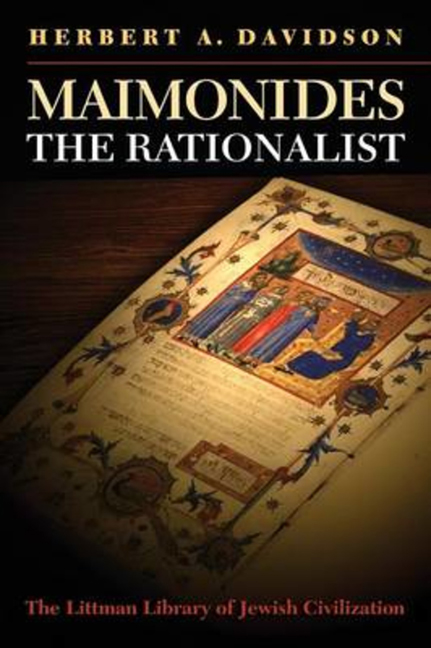Book contents
- Frontmatter
- Dedication
- Preface and Acknowledgements
- Contents
- Publisher's Note on Transliteration
- Abbreviations and Note on Sources
- 1 The Study of Philosophy as a Religious Obligation
- 2 The First Two Positive Divine Commandments
- 3 Maimonides' Knowledge of the Philosophical Literature in his Rabbinic Period
- 4 Maimonides' Shemonah perakim and Alfarabi's Fuṣūl Muntaza'a
- 5 Maimonides' Knowledge of the Philosophical Literature in his Later Period
- 6 Maimonides on Metaphysical Knowledge
- 7 A Problematic Sentence in Moreh nevukhim, ii. 24
- 8 Maimonides' Ethical Systems
- 9 Maimonides the Rationalist
- Works Cited
- Index
2 - The First Two Positive Divine Commandments
- Frontmatter
- Dedication
- Preface and Acknowledgements
- Contents
- Publisher's Note on Transliteration
- Abbreviations and Note on Sources
- 1 The Study of Philosophy as a Religious Obligation
- 2 The First Two Positive Divine Commandments
- 3 Maimonides' Knowledge of the Philosophical Literature in his Rabbinic Period
- 4 Maimonides' Shemonah perakim and Alfarabi's Fuṣūl Muntaza'a
- 5 Maimonides' Knowledge of the Philosophical Literature in his Later Period
- 6 Maimonides on Metaphysical Knowledge
- 7 A Problematic Sentence in Moreh nevukhim, ii. 24
- 8 Maimonides' Ethical Systems
- 9 Maimonides the Rationalist
- Works Cited
- Index
Summary
The first of the positive commandments is to know that God exists.
MAIMONIDES Mishneh torah, introduction, list of commandmentsThe 613 Commandments
THERE ARE DIVERSE WAYS of telling the story of the 613 commandments believed to have been given to Moses at Sinai, but they all start from the same point. The starting-point is a dictum cited by the Babylonian Talmud in the name of Rabbi Simlai, a Palestinian rabbi active about the end of the third and beginning of the fourth centuries. He was not a member of the circle that wielded authority in the ritual and legal sphere.
According to the printed editions of the Babylonian Talmud, ‘Rabbi Simlai taught [darash]: 613 commandments were stated to Moses: 365 negative commandments, paralleling the number of days of the [solar] year, and 248 positive commandments, paralleling the number of discrete segments [avarim] in [the body of] a human being.’ No manuscript variants are known to me, but even without them it is easy to see that the talmudic dictum took different forms. The standard edition of Ein ya'akov, the sixteenth-century work that extracts all of the aggadic—that is to say, non-legal—material from the Babylonian Talmud, makes a small addition. In place of the words ‘613 commandments were stated to Moses’, it reads: ‘613 commandments were stated to Moses at Sinai’, and that is the form in which Maimonides and Nahmanides quote the dictum. Sefer halakhot gedolot quotes Rabbi Simlai as having taught that ‘Israel were commanded regarding 613 commandments’ and at another spot it refers, perhaps now speaking in its own voice and not quoting, to ‘613 commandments that Israel received at Sinai’.
A good deal is left open. It is unclear whether we are being informed that each and every one of the 613 commandments is explicit in the Written Torah or whether some can only be known thanks to the enhancement of the Written Torah through the Oral Torah. It is not even clear whether we are to understand that all 613 were preserved and handed down to posterity. The Babylonian Talmud in one place speaks of hundreds or even thousands of halakhot and dialectical inferences that were lost when Moses died. If matters are considered from wholly within the rabbinic framework, it is thus conceivable that many of the 613 commandments have disappeared forever.
- Type
- Chapter
- Information
- Maimonides the Rationalist , pp. 15 - 52Publisher: Liverpool University PressPrint publication year: 2011



